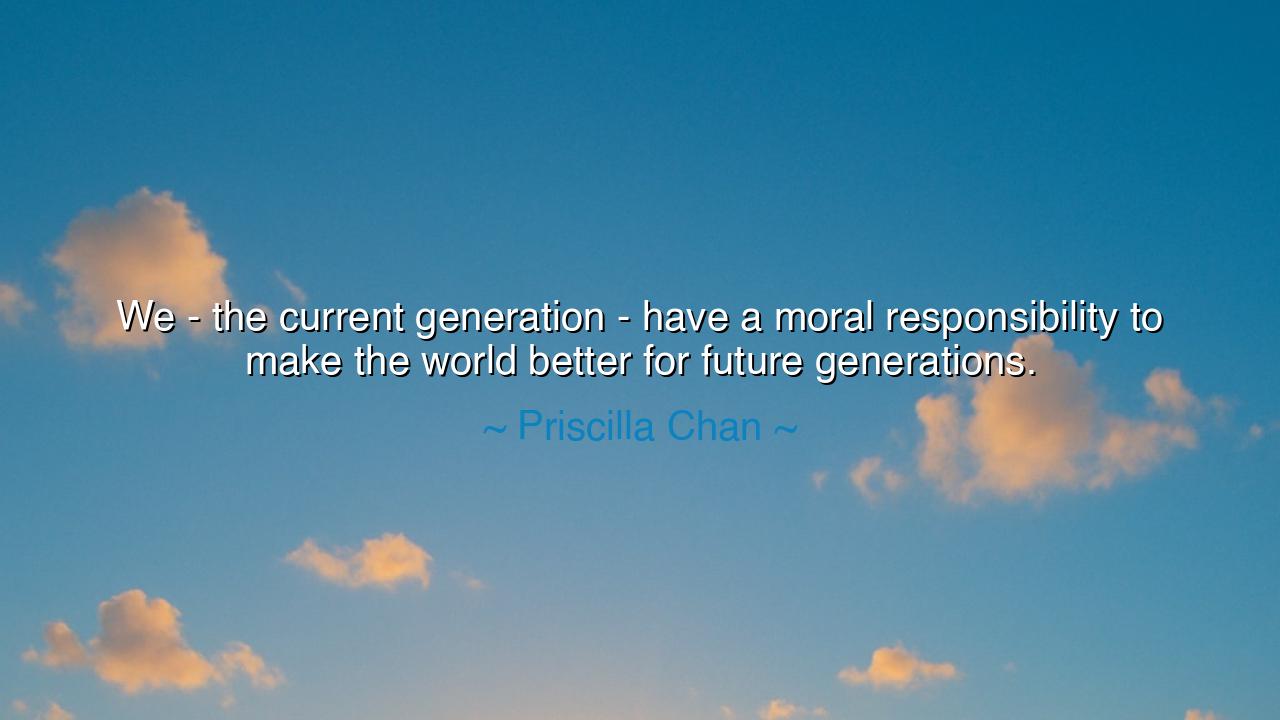
We - the current generation - have a moral responsibility to make
We - the current generation - have a moral responsibility to make the world better for future generations.






In the great unfolding of time, there are moments when the weight of legacy presses upon the shoulders of those who stand in the present. Priscilla Chan’s words, "We—the current generation—have a moral responsibility to make the world better for future generations," speak to a universal truth that transcends both time and culture: we are not mere caretakers of our own lives but stewards of a world that belongs as much to those who come after us as it does to ourselves. This moral responsibility is not a call for superficial gestures but for a deep, unwavering commitment to compassion, sustainability, and justice. It is an acknowledgment that the future we inherit is not just a gift, but a duty to shape with wisdom and foresight.
In the ancient world, this sense of duty to future generations was woven deeply into the fabric of society. The Greeks, for instance, believed that the well-being of the state was not only about the current generation but about ensuring that the virtue and wisdom of their culture were passed on. In the Republic, Plato explored the concept of justice in the city-state, arguing that each generation had the duty to nurture and teach the next, ensuring that the ideals of wisdom, courage, and temperance were preserved for those yet to come. Plato’s vision of a harmonious society was not limited to his lifetime, but looked forward, striving to create a world that could prosper long after his ideas were first put into practice.
Similarly, the Romans placed great value on duty to both their ancestors and descendants. The Roman concept of pietas was not just about honoring the gods, but also about honoring one’s family, community, and the future of the Roman state. Figures like Cicero argued that a person’s duty extended beyond their own life, and that every decision made should consider the long-term impact on both society and the empire. This sense of responsibility was inseparable from the identity of the Roman citizen, as it was believed that the future success of the empire was in the hands of those living in the present, much like Chan’s call for today’s generation to improve the world for future generations.
Consider the Great Wall of China, built over centuries by successive Chinese dynasties. This monumental structure was not constructed merely for the rulers of the time but was designed with a vision for the future—a future in which the safety and stability of the Chinese people would be protected from external threats. The laborers and leaders who contributed to the Great Wall knew that their actions would resonate far beyond their own lives. They were not merely building for the present, but for generations who would benefit from the strength of their sacrifice. The wall stands as a symbol of long-term thinking, an understanding that the success of one generation is intertwined with the well-being of those who will follow.
This lesson echoes through history: each generation must face the challenge of creating a world that is worthy of those who will inherit it. The moral responsibility we bear is not a passive inheritance but an active role in shaping the course of events. Whether in terms of politics, environmental sustainability, or social justice, we are tasked with building a foundation upon which future generations can build. Just as the ancients considered their actions in the light of future implications, so too must we. The choices we make today—about how we treat the planet, how we govern ourselves, and how we nurture one another—are the building blocks for tomorrow’s world.
In practical terms, this means that we must take deliberate actions to ensure a positive legacy. We must choose to live with a sense of purpose that goes beyond immediate gratification. Whether it is through conserving resources, fighting injustice, or building inclusive societies, the time to act is now. Chan’s words call for an awareness of the larger impact of our lives and decisions, reminding us that every small action can contribute to the greater good. Just as the leaders of the past understood the importance of shaping the future, so too must we carry the torch forward with vision and commitment.
Ultimately, Chan’s call to action is a reminder that we do not live in isolation. The future is a shared inheritance, and it is through our collective effort that we can ensure it is a future of opportunity, justice, and peace. As the ancients knew, the choices we make today have far-reaching consequences, and we must strive to act with wisdom, compassion, and foresight. In doing so, we can fulfill our moral responsibility to those who will come after us, ensuring that the world they inherit is one that is better, more just, and more harmonious than the one we found. The future is not a distant, unknown force; it is being shaped by our actions right now, and the legacy we leave will be the world they inherit. Let us act, then, with the weight of this responsibility in mind, knowing that our choices today echo through the generations that will follow.






AAdministratorAdministrator
Welcome, honored guests. Please leave a comment, we will respond soon